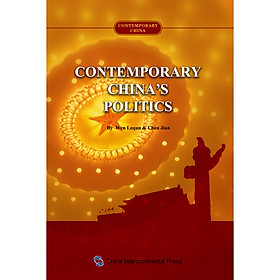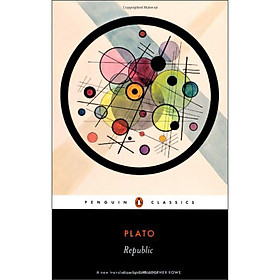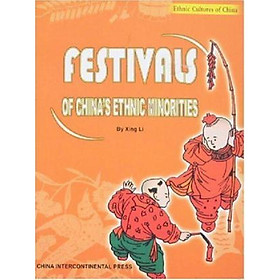Contemporary China's Politics
The Contemporary China Series focuses on introducing the ways, systems, thoughts and charm of China to foreign readers who are interested in contemporary situation of China. With impressive...
SKU: 5334546435664
The Contemporary China Series focuses on introducing the ways, systems, thoughts and charm of China to foreign readers who are interested in contemporary situation of China.
With impressive Chinese values as the theoretical basis, the eight-volume series, covering the overall strategies on the five construction aspects, namely, economy, politics, culture, society and ecological civilization, elaborated in the Report of the 18th CPC National Congress, gives a comprehensive introduction to the general situation of main fields of contemporary China and the socialist development road with Chinese characteristics, and establishes a good country image.
Members of the editorial committee and authors are experts from the Institute of Contemporary China Studies, the Party History Research Center of the CPC Central Committee, Peking University and Renmin University of China etc.
The series’ targeted readership includes foreign adults who pay close attention to China’s status quo and future and hope to learn about the country, and extensive Chinese readers as well. The series can also serve as a reference book for foreign students who are learning Chinese language and culture to study China’s contemporary situation and development.
After 2000-year-plus feudal society and 100-year-plus semi-colonial and semi-feudal society, socialist democratic politics has been gradually established under the leadership of the CPC. The book introduces not only China’s basic political system and operation mechanism but also the practice of contemporary China’s politics, including administrative system reform, construction of legal China, political participation of citizens, anti-corruption and clean government efforts, reflecting the achievements of contemporary China’s political civilization.
Wen Lequn, LLD, has been engaged in studying the history of the Communist Party of China, Chinese Politics and International Politics. His works include Deng Xiaoping and Contemporary China, China’s Road to Modernization in the 20th Century (Political Volume 1949-2000) (coauthored).
Chen Jian, LLD, specializes in studying Chinese parties and politics. His works include Development and Progress of Democratic Politics and The 90 Years of the Communist Party of China (coauthor).
Contents
Preface
The Socialist Democratic Political System with Chinese Characteristics
The People’s Congress System under the Principle of Democratic Centralism
The Multi-party Cooperation and Political Consultation System under the Leadership of the Communist Party of China
The System of Regional Autonomy for Ethnic Groups
Grassroots Self-governing and Democratic Management System
The Leadership System and Political Operation Mechanism
The System for Collective Leadership and Division of Responsibility
Administration Structure and Functions
Decision-making and Implementation and Operation Mechanisms
Restriction of Power and Supervision Mechanism
Innovations in Administrative Control System
The Transformation and Correct Implementation of Government Functions
Promotion of Law-based Administration
The Establishment and Improvement of the Civil Service System
Transparent Governmental Affairs and Administrative Accountability
Organization Adjustment and Super-ministries Reform
Promoting the Rule of Law
Legislative System and Legal System in China
Safeguarding Human Rights under Legal System
Judicial System Reform and Fair Administration of Justice
Safeguarding the Authority of the Constitution and Promoting the Spirit of Law
Citizens’ Broad Political Participation
Multi-level Electoral System
Political Consultation and Social Negotiation
The Practice and Development of the Urban and Rural Grassroots’ Democratic Autonomy
Governing Online and Network Supervision
Anti-corruption and Building a Clean Government
Working Mechanisms for Anti-corruption and Building a Clean Government
Legal Systems for Anti-corruption and Upholding Integrity
Severely Punishing Corruption according to Law
Integrity Education and Culture
International Cooperation and Exchanges on Anti-corruption
Restriction of Power and Supervision Mechanism
Since the policies of reform and opening-up were put into practice, China has made great adjustments of the power structure and the operating mechanisms to enable the decision-making power, executive power and the authority of supervision to restrict each other and coordinate with each other. China has done these reforms by following the principles of "reasonable structure, scientific allocation, rigorous procedures and effective restriction". At the same time, China has been paying close attention to promoting the procedural and transparent operation of state power in order to enhance power restriction and supervision. Currently, China utilizes a supervision system with Chinese characteristics, consisting of the internal supervision of the CPC and the government, the supervision of the People’s Congress, the democratic supervision of the CPPCC, the judicial supervision, the citizen supervision and supervision by public opinions. The supervisors are relatively independent, yet they are in close cooperation with each other.
The internal supervision of the CPC means that the Party organizations at all levels and the Party members, supervise the Party’s leading organizations and cadres, especially the people chiefly in charge of the leading groups at different levels. This supervision is done in accordance with the Constitution of CPC and other Party regulations as well as relevant state laws. The CPC has been exploring measures and methods to enhance the inner-party supervision and continuously improving 10 inner-party supervision systems, such as the system of collective leadership and responsibility division, the system for notifying and reporting major events, the system of democratic life meetings and the system of inquiry. Both the Central Committee and the Party committees at provincial levels have inspection organizations, which are responsible for inspecting and supervising the execution of the Party’s guidelines, policies, and decisions. These inspection organizations also form a responsibility system for the construction of the Party conduct and enforce an honest and clean government by the subordinate leading groups and their members. These organizations also monitor the conduct and diligence of these groups and their members. The discipline inspection organizations of the Party are responsible for unified management of the representative organizations, and help enhance the supervision of the leading groups of the representative organizations, especially the top cadres. Great efforts should be made to develop inner-party democracy to create favorable conditions for the enhancement of the inter-party supervision, and improve the system of the Party congress. These internal conditions should also give full play to the function of the plenary sessions of the Party committees in making major decisions, and promote and improve the system for the standing committees of the Party committees to make regular reports to the plenary sessions of the Party committees and accept supervision. The inner-party election system should be reformed and improved while the scope and proportion of multicandidate recommendation and election should be defined to gradually expand scope for direct election of leading group members at the primary Party organizations. The Regulations of the Communist Party of China for Guaranteeing the Rights of the Party Members defines the procedures for the Party members to execute their rights and the rights of the Party members to participate in inter-party supervision.
The supervision of the people’s congresses at different levels means that the organizations of state power are responsible for the supervision of the state’s administrative organizations, judicial organizations and implementation of state laws on behalf of the state government and the people. The people’s congresses are entitled to execute all the supervision rights based on the relevant laws and regulations. They are tasked with enhancing the supervision of the governments, courts, procuratorates and their staff through inquiry, examination of law enforcement, listening to and reviewing reports of related departments and reviewing the budget to promote administration by law and justice, and prevent and control corruption.
The internal supervision of the governments includes supervision and monitoring by different levels and supervision by professional organizations, such as auditing organizations. The superior governments supervise the lower-level governments; the superior departments supervise the lowerlevel departments; the governments supervise the departments under their administration; the heads of administrative departments supervise the staff of these departments. The supervisory organizations are obligated to completely fulfill their statutory duties for law enforcement supervision, anti-corruption supervision and performance supervision. These organizations also supervise the exercise of duties, fulfillment of responsibilities and diligence and integrity of the supervision objects. The auditing organizations are responsible for supervising the budget performance, final settlement and other financial activities of the governments in accordance with the relevant laws and regulations. These supervision modes play an important role in standardizing and promoting administrative law enforcement and constructing a law-based government.
The democratic supervision of the CPPCC is a mode of supervision with the Chinese characteristics. The Chinese People’s Political Consultative Conference (CPPCC) is an important organization under the multi-party cooperation and political consultation system led by the CPC. The CPPCC supervises the execution of the Constitution and laws and regulations, implementation of major policies and guidelines. In addition, the CPPCC supervises the duty fulfillment and discipline and law compliance of the state organizations and their staff by holding conferences, putting forward proposals, organizing CPPCC members to conduct inspection and carrying out democratic review. The Party committees and the people’s governments at all levels are instructed to consult with the CPPCC committees and democratic parties at the same level before issuing any important regulations.
Preface
The contemporary political system of China is originated from the political system established during the revolutionary war period. It took shape at the beginning of the New China and has had an integrated development since the reform and opening-up policies were put into practice. It is integrated with the great achievements of the world political civilization and deeply rooted in the Chinese conditions, with obvious Chinese characteristics. Although different countries adopt different systems and have different cultures, nearly all the countries in the world have a common goal, namely, prosperity, democracy and civilization. The CPC has been adhering to realizing the goal for the democracy of majority and set as one of its targets to rejuvenation of the Chinese nation.
The development of modern democratic politics indicates that, due to the differences in history, culture, tradition, geographical conditions and development, people in different countries take different ways to strive for and develop democratic politics. The democratic development of China began with anti-imperialism and anti-feudalism and national independence and people’s liberation. It was the first step and a key step towards democratic politics. The goal of the national democratic revolution of China in modern times was to get back the national sovereignty and overthrew the semi-colonial and semi-feudal system that had been established since 1840 when the First Opium War broke out and the Chinese people were trapped into the oppression of the imperialism, feudalism and bureaucratism. At that time, national independence and liberation were the most urgent common wish of all the Chinese people. Therefore, the founding of the People’s Republic of China meant the initial implementation of the democratic politics in China from the perspective of people’s will.
After the founding of the New China, the CPC showed respect to the will of the people. Taking the special national conditions and history into consideration, the people’s democratic national political power featuring people’s will was established. It established the system of people’s congresses, the system for multi-party cooperation and political consultation under the leadership of the CPC, the system for regional autonomy of ethnic groups and the system for primary-level self-governance. These socialist political systems with Chinese characteristics become the foundation of the democratic politics of modern China and reflect the political concept to allow the people to be the masters of the country.
In the late 1970s and early 1980s, along with the changes of international and domestic situations, the CPC and the Chinese government decided to carry out the reform and opening-up policies. To meet the new requirements, the CPC and the Chinese government insist on adopting the basic socialist political system while abandoning the traditional and rigid Soviet-style political system and operation mechanism to reform the political system and promote the construction of socialist democracy. After years of practice and exploration, a basic political pattern with the leadership of the CPC, people being the masters of the country and ruling the country by law has taken shape. The construction of socialist democracy has made great progress. The channels for the people to execute democratic rights have been diversified. The national leadership system, political operation mechanism and administration system have been integrated. The systems for effective anti-corruption and construction of a clean government have been improved. In November 2013, the Third Plenary Session of the 18th Central Committee of the Communist Party of China made specific plans for deepening the reform of the political system of China, marking a new start for all-around reform. Under these plans, the reform of the political operation mode, government examination and approval, anti-corruption and clean governance system, judicial adjudication and procuratorial work systems and the system for reform through labor have been carried out, and unprecedented effectiveness has been made.
We have reasons to believe that, under the increasingly improved and mature leadership of the CPC, the socialist democracy and legal system with Chinese characteristics will continue to be improved. The construction of the socialist democratic politics with Chinese characteristics will show more vigor and exuberant vitality. Meanwhile, the fast development of China in the past decades indicates that, following the way to develop socialist democracy with Chinese characteristics chosen by the Chinese people, the wish of the Chinese people to become the masters of the country will be realized, and China will gradually realize its national prosperity, democracy and civilization.
Giá sản phẩm niêm yết của Politics & Social Sciences Contemporary China's Politics trên các sàn TMĐT đã bao gồm thuế theo luật hiện hành. Tuy nhiên tuỳ vào từng loại sản phẩm hoặc phương thức, địa chỉ giao hàng mà có thể phát sinh thêm chi phí khác như phí vận chuyển, phụ phí hàng cồng kềnh, ...
Mức giá và các nhà cung cấp được liệt kê tại đây chỉ dùng để bạn tham khảo. Khi quyết định mua hàng bạn cần xem xét thêm về đánh giá của khách hàng tại shop đó. Sau cùng bạn chọn mua sản phẩm từ nhà cung cấp mà bạn cho là uy tín nhất với mức giá hợp lý nhất. Chúng tôi không trực tiếp bán hàng cũng như vận chuyển và không chịu bất kỳ trách nhiệm nào về quyết định mua hàng của bạn.
| SKU: | 5334546435664 |
|---|



















